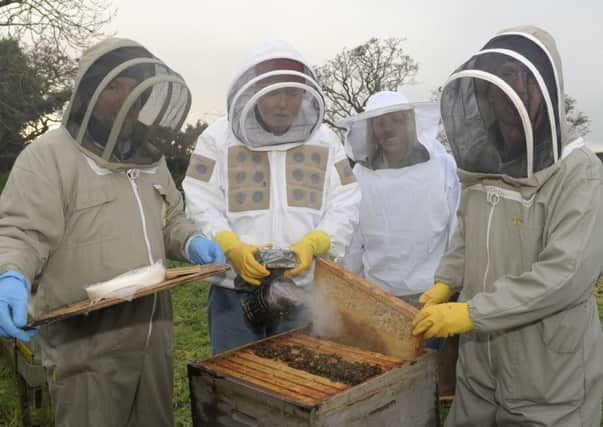Why swarms of '˜wanna-bees' go ape for apiaries


The clue is in our headgear; these are not veils pertaining to holy matrimony, but rather, a ‘uniform’ to protect our faces from the threat of being stung by any of the thousands of honeybees that call this wintry setting - Dromore Apiary - home.
Jim Fullerton, Robert McCreery and Patrick Lundy are all members of Dromore Beekeepers’ Association, and amongst the 1,000 or so men and women across the Province who belong to similar clubs that fall under the umbrella body that is the Ulster Beekeepers’ Association.
Advertisement
Hide AdAdvertisement
Hide AdIt’s a pastime that is attracting new members all the time; in fact, Dromore alone expects to attract 20 - 30 new members when it starts its preliminary course in beekeeping next week (Tuesday January 26).


“For me, my big moment is in March or April when I open my hive and find loads of bees there, and think, ‘yes, I’ve done enough to bring them through the winter time’,” says Jim, as I press the men on what makes them so passionate about looking after these winged insects, seen by many of us as little more than a summertime pest.
As Robert, who will be tutoring prospective beekeepers on the course says, beekeeping is an art.
“It is an art in being able to handle the hive without getting stung and being able to tell at what stage the bees are in their development for that year,” he says.
Advertisement
Hide AdAdvertisement
Hide Ad“Are they, for example, about to swarm? Or perhaps you might breed a new queen - again that’s part of the enjoyment. And there are so many things you can do if you keep bees. For instance, some people go into candle making.


“One of our members in Killinchy makes hand creams and lip balms and moisturizers which she sells in St George’s Market in Belfast most weeks.
“You can also make mead with any extra honey that you have, and it’s a lovely drink in the winter.”
(One of the oldest alcoholic drinks known to man, mead is made from water and honey via fermentation with yeast.)
Advertisement
Hide AdAdvertisement
Hide AdAdds Jim: “And when you give people a jar of homemade honey, people just think you’ve given them £100! It is nice to make your own products and to give them to somebody.”
Of course, before any self-respecting would-be beekeeper can start to think about producing their own line of toiletries, there’s a whole natural world pertaining to these fascinating creatures that they have to learn about first.
And as Patrick - who seems to have a pretty good grasp on it - explains, the beekeeping courses teach them just that.
“I joined Dromore myself in 2003,” he says, after we return from opening up one of the hives, where we found a huge throng of buzzing bees, huddled together, feeding off the honey they have stored up specifically for this cold time of year, and more than a little riled at the intrusion.
Advertisement
Hide AdAdvertisement
Hide Ad(Thankfully, while initially I hung back, as is one’s natural reaction to the sound and sight of bees, not one even attempted to take out its wrath on me, and as my curiosity and confidence grew, I took a few steps closer to observe the hive with fascination.)
“My wife bought me a beehive - just the box with no bees - for Christmas, because we had moved to the country from Belfast.
“I had no idea about what beekeeping was all about , so I went up to Dromore Beekeepers’ Association where Robert was the chairman, and told them I didn’t know anything about bees. Robert said, ‘you’re very welcome, take a seat.’
“I went to the meetings at the course over in Killinchy, and that summer of 2003, I got a swarm of bees which I brought home to my apiary.
Advertisement
Hide AdAdvertisement
Hide Ad“I got advice from a beekeeper called Billy Douglas in Ballynahinch, who came and gave me help on how to look after my hive, and make sure I had a queen in there. I have been keeping bees since then.”
Embarrassingly, I feel I have to stop Patrick right there, for a quick refresher on the definition of ‘queen bee’,and all the facets that constitute a hive.
Mercifully, he is patient.
“There’s only one queen in the hive,” he says. “There are about 40,000 worker bees which are female, and they go out and collect all the honey.
“There are a few thousand male bees, but their only role is when it comes to a new queen being born.
Advertisement
Hide AdAdvertisement
Hide Ad“After about 10 days or two weeks, she will fly up into the air. She meets in a ‘drone congregation area’, where there drones from all the different apiaries from various areas of the country.
“The queen will mate with as many as 12 - 20 of them, and it’s important that she does so with more than one drone to get that mixture of genetics. She retains the sperm from the drones for all her life, and the drones who successfully mate with her die.
“The queen comes back to her hive and lays eggs, often up to 2,000 a day in the summer.
“She stays in the hive for one to two years until her pheromones (mixtures of chemical substances), which regulate the behaviour of the hive, begin to diminish, and then the worker bees decide they need a new queen.
Advertisement
Hide AdAdvertisement
Hide Ad“They will build a new queen cells, special cells in which she herself will lay an egg, which will be her own downfall because a new queen will develop.”
What happens then is that around half of the worker bees will take the old queen out of the hive in what is known as a swarm.
Patrick explains they are literally seeking a new home, and they leave behind the other half of the bees with the new young queen who is just developing and emerging.
Then after 10 days or so, the new queen will fly out and seek her drones, and so the cycle begins again.
Advertisement
Hide AdAdvertisement
Hide AdThe role of the beekeeper is to help maintain this cycle of life, particularly in the cold winter months.
They must also manage a major problem parasite for bees called varroa, minute crab-like creatures which attach themselves to the bee’s body and suck their blood.
When a beekeeper gets really confident, he or she can start to learn about breeding bees, and taking queen eggs and placing them in other hives, where they can be drawn into new queen cells by the workers there.
Robert explains that it is often the uncertainty of breeding that attracts some people to the practice.
Advertisement
Hide AdAdvertisement
Hide Ad“For example, we have an elderly member who has bred pigs, cows, and sheep all his life, and was the managing director of a salmon farm, but he finds breeding bees almost impossible, because you can’t control one half of the mating stream (i.e the drones, which gather from hives all over the country, and as such, can be unpredictable in their character).
I smile at the implication of ‘wild drones’, but the men assure me that bees can become enraged in seconds, for no apparent reason, other than, like their human handlers, one supposes, they’re just having ‘an off day.’ They’re also particularly irritated by strong smells like alcohol, perfume and aftershave.
And it is learning to accept that, and handle the bees both safely and confidently, that the beekeeping courses will teach you, adds Patrick.
He tells us about one young man who felt demoralised because he had been getting stung by his angry hive, and as a result felt afraid of them.
Advertisement
Hide AdAdvertisement
Hide AdPatrick mentored him, and when he saw that he was doing exactly all he should be, his confidence came back as he saw for himself he wasn’t doing anything wrong.
“One of the things you have to learn is when to close up the hive for a while if the bees are cross.
“Beginners are given this kind of training as well as it cane be easy for them to get demoralised.”